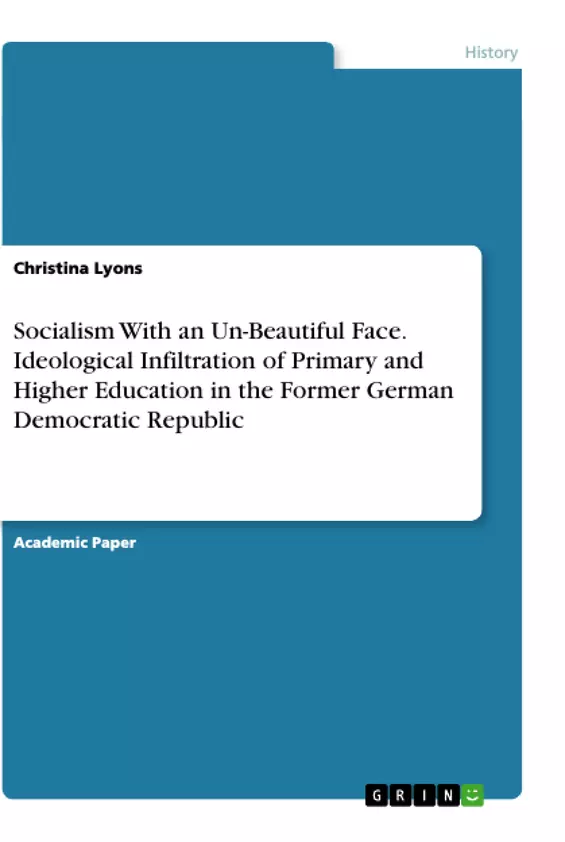Alas, as Arnswald (2004) bemoans, today’s generation of German students has no recollection any more about this part of German history, two decades after the peaceful revolution in the GDR and the Fall of the Berlin Wall in 1989. Students of other countries will have even less memories of images seen on TV, or accounts read in the print media – moreover, they have not lived through these experiences. This justifies the following literature review, which will give evidence of educational inequality during the GDR regime under the Socialist Unity Party (Sozialistische Einheitspartei Deutschlands; SED). It will be organized in five sub-chapters: 1. the case study of Ute, the “privileged”; 2. a historical overview of the East German school system; 3. the East German School system as viewed by proponents and opponents; 4. the purging of East German schools after the unification (political “soundness”); and 5. the implications for female students after the “Wende” (“Change”; unification).
“We knew what the rewards were.... And we wanted them. The coaches and teachers reminded us every week that we were the Priviligierten. Even if we didn’t always feel so ‘privileged,’ we believed we were the elite”. This comes from the mouth of an East German student. Can one be privileged in the educational sector, thus having unique career opportunities that fellow students do not have? The striking case study of an East German athlete, skater Ute, shall shed light on the unethical and politically and ideologically infiltrated practices of the school system of the former German Democratic Republic.
Inhaltsverzeichnis (Table of Contents)
- Introduction
- Case Study of Ute, the “Privileged”
- Historical Overview of the East German School System
- The East German School System as Viewed by Proponents and Opponents
- The Purging of East German Schools after the Unification (Political “Soundness”)
- The Implications for Female Students after the “Wende” (“Change”; Unification)
Zielsetzung und Themenschwerpunkte (Objectives and Key Themes)
This literature review explores the ideological infiltration of East German schools during the GDR regime. The focus is on the impact of government policies on education, specifically examining the case study of Ute, a “privileged” student athlete. The review investigates the influence of the Socialist Unity Party (SED) on curriculum, the rise of new intelligentsia, and the suppression of alternative ideologies. It also highlights the challenges faced by female students after the unification of Germany.
- The impact of government policies on education in the GDR
- The case study of Ute, a “privileged” student athlete
- The role of the Socialist Unity Party (SED) in shaping education
- The suppression of alternative ideologies in East German schools
- The challenges faced by female students after the unification of Germany
Zusammenfassung der Kapitel (Chapter Summaries)
- Introduction: Introduces the topic of ideological infiltration of East German schools and presents the case study of Ute as a key example of educational inequality.
- Case Study of Ute, the “Privileged”: Examines the experiences of Ute, a gifted ice skater who benefited from the “privileged” system in East Germany, highlighting the advantages and disadvantages of this system.
- Historical Overview of the East German School System: Provides a historical overview of the East German school system, outlining the key developments and changes in the educational landscape during the GDR regime.
- The East German School System as Viewed by Proponents and Opponents: Presents contrasting perspectives on the East German school system, examining the arguments of proponents and opponents of the regime's educational policies.
Schlüsselwörter (Keywords)
The key themes and concepts explored in this text include ideological infiltration, education inequality, GDR regime, Socialist Unity Party (SED), “privileged” students, athletic training, political indoctrination, purging of schools, and female students in a post-unification context.
Frequently Asked Questions
How was the East German school system ideologically infiltrated?
The Socialist Unity Party (SED) controlled the curriculum, teacher training, and access to higher education to ensure political loyalty to the socialist regime.
Who was Ute in the context of this study?
Ute is a case study of a "privileged" student athlete who received special educational opportunities due to her athletic talent, illustrating the GDR's elite support system.
What happened to East German schools after the reunification?
There was a process of "purging" or restructuring to ensure political soundness and to remove the pervasive socialist ideology from the educational system.
What challenges did female students face after the "Wende"?
The transition to the West German system brought new social and economic challenges, impacting the career paths and social status of former GDR female students.
Why is there a lack of knowledge about GDR history among today's students?
The paper suggests that two decades after the wall's fall, educational focus has shifted, leading to a generational gap in the understanding of the GDR's educational inequality.
- Quote paper
- Dr. Christina Lyons (Author), 2009, Socialism With an Un-Beautiful Face. Ideological Infiltration of Primary and Higher Education in the Former German Democratic Republic, Munich, GRIN Verlag, https://www.hausarbeiten.de/document/1132543


